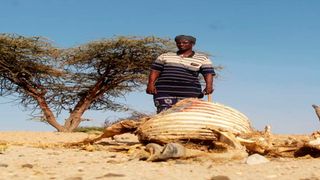
A herder stands over a carcass at Horri Guda in North Horr, Marsabit County. After grappling with livestock losses in the hundreds of thousands caused by lack of rains for two consecutive years, two days of heavy rains claimed nearly all of the remaining herds.
| Nicholas Komu | Nation Media GroupNews
Premium
Rain or drought, Marsabit pastoralists suffer all the same
What you need to know:
After grappling with livestock losses in the hundreds of thousands caused by lack of rains for two consecutive years, two days of heavy rains claimed nearly all of the remaining herds.
More than 40,000 goats and sheep perished following a heavy downpour.
The massive deaths are attributed to frostbite and the weak nature of animals, which were emaciated by the prolonged drought.
In Marsabit County, pastoralists are doomed if it rains and doomed if it does not.
This was proved over the past week when more than 40,000 animals died following heavy rains that were preceded by two years of drought.
After grappling with livestock losses in the hundreds of thousands caused by lack of rains for two consecutive years, two days of heavy rains claimed nearly all of the remaining herds.
As of Friday, more than 40,000 goats and sheep had perished following a heavy downpour in Dukana and North Horr sub-counties.
In Dukana, 18,475 animals had died, Deputy County Commissioner Solomon Mwapapale told the Nation.
He attributed the massive deaths to frostbite and the weak nature of animals, which were emaciated by the prolonged drought.
In North Horr, more than 15,000 animals were reported to have died.
North Horr Deputy Commissioner Silvester Mwangulu said more than 10,000 small stocks succumbed to the rains, with Maikona, North Horr and Illeret wards hit hardest.
He empathised with herders who were hit by this double tragedy and whose future looked bleak after being stripped of their sources of income.
Upper Eastern Red Cross Kenya Coordinator Maurice Anyango said an assessment of the extent of the damage caused by flash floods was underway.
He was saddened that the rains that were expected to help refill dams in the county, and most of which were at low levels, brought deaths instead.
He warned residents, the county government and other stakeholders to prepare for drought and storms with appropriate emergency plans to limit such massive losses in future.
Tumal Orto, a livestock farmer and a businessman in Marsabit, was contemplating completely dropping livestock rearing.
Hundreds of his animals perished in North Horr as a result of the biting drought, and as if that was not enough, he lost another herd of more than 300 goats and sheep to the recent heavy downpours.
He recounted how two elderly residents in North Horr ward nearly took their own lives on learning that they had lost the few animals they had to flash floods.
He said the majority of livestock farmers in the county, especially in North Horr, Dukana and Laisamis, were already living on the verge of despair and depression after the huge losses caused by droughts.
He said pastoralism can be a tough venture. If it rains too much, herders incur losses. If it doesn't rain, there are also untold losses. You can be doomed if it rains but doomed if it doesn't.
Climate change and erratic weather patterns seem to have caused particular havoc in residents' sources of livelihood.
Many farmers held their breaths in the hope that the strong gusts of wind that blew across the land were a good sign of rains in the offing.
Unfortunately, the much awaited rains only presented another form of tragedy that was never envisioned by farmers.
Drought here is a recurring natural phenomenon and the scorching heat wave has become increasingly harsh and long over the past decade.
Marsabit also experiences recurring flash floods during the rainfalls.
Marsabit’s geographical location and climate make it extremely vulnerable to drought and periods of high rainfall as it hosts the Chalbi desert and Lake Turkana.





